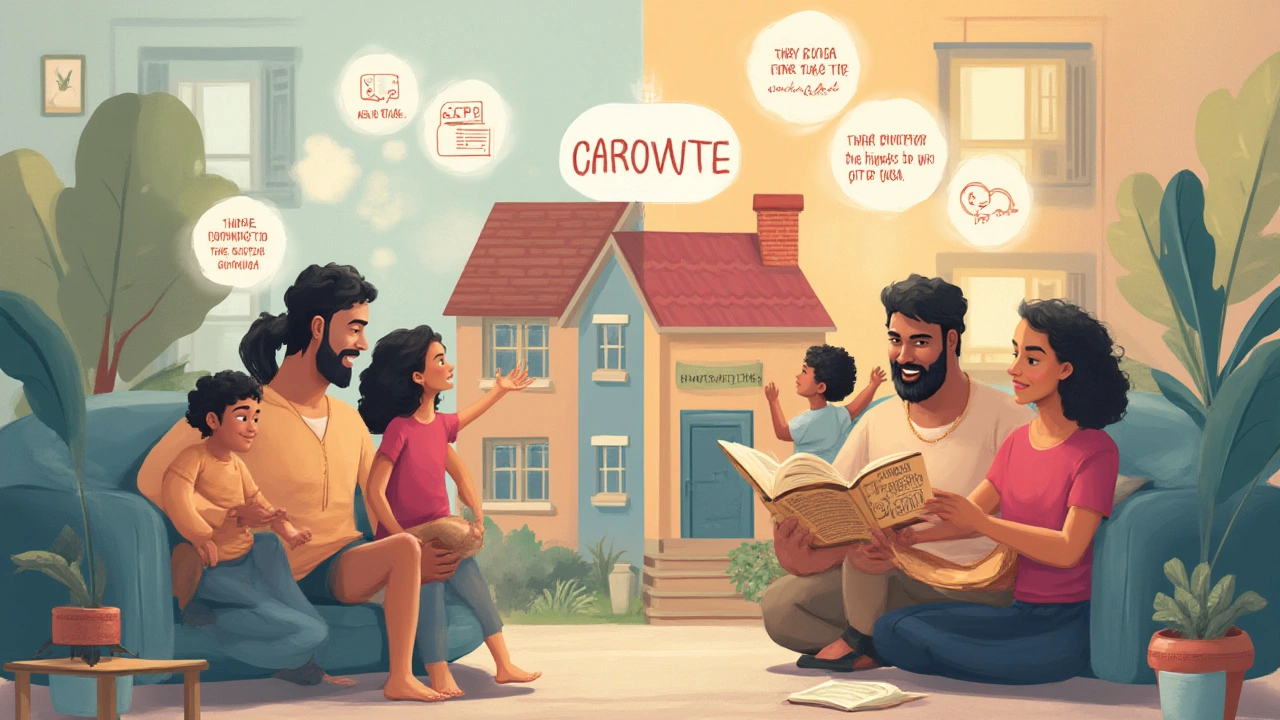Is Rent-to-Own Legal in Virginia? Guide to Rules, Tips, and Pitfalls

Jul, 15 2025
Imagine picturing yourself in a place you can finally call home, but your credit score isn’t there yet, or the down payment seems out of reach. “Rent-to-own” pops up as this secret passage between renting and buying, and for thousands of hopeful Virginians, it’s a shortcut that actually exists. But is it even legal to lock in a lease with dreams of ownership in Virginia? Here’s the eye-opener: not only is rent-to-own legit, Virginia has its own quirks that can catch people off guard. Folks sometimes hear whispers about rent-to-own being a “gray area,” but dive into the codebooks, and you find nothing shady about it. As of July 2025, rent-to-own deals are happening in bustling Richmond neighborhoods, quiet suburbs, and even rural towns, all under watchful legal eyes. Still, what nobody tells you—until it’s too late—are the small print traps and the things Virginia law won’t forgive, no matter how eager you are for the keys.
How Rent-to-Own Works (And Why People Try It in Virginia)
Rent-to-own is like ordering the dinner special but getting to pay part now and the rest if you come back for dessert. In its simplest form, you sign a lease, usually for one to three years. Every month, you pay rent—slightly higher than market average—but some of that chunk piles up as a credit toward buying the place later. There’s almost always a written option agreement attached. This contract lays out the future sale price, how much you’ll credit each month, deadlines, and exactly how you “trigger” your right to buy.
Why do Virginians jump at these deals? The reasons are pretty relatable. Maybe your credit score from that medical bill hiccup means banks won’t look at you, or you changed jobs recently and can’t cough up $40k down. Or (and this one’s real) you found a neighborhood where houses get snatched before they hit Zillow—but you aren’t quite mortgage-ready. Rent-to-own gives you breathing room—a window for cleaning up your credit or saving cash—without losing the house to another eager buyer. In hotter real estate pockets like Northern Virginia, some sellers also offer rent-to-own because it opens their door to more buyers, especially if their listing has been sitting a while.
But here’s what’s wild: In Virginia, rent-to-own deals aren’t copied from some standard form online. Every contract can look different. There’s no “Virginia rent-to-own agreement” template that covers everything, and that creates risk. It’s sort of the Wild West of real estate contracts if nobody does their homework. Even the option fee (often thousands of dollars upfront, which is usually nonrefundable) isn’t dictated by state law but hammered out between buyer and seller, and it can range from a few hundred bucks to tens of thousands. So there’s room for negotiation—but also for getting ripped off if you’re not careful.
Another interesting angle is that rent-to-own contracts in Virginia often require tenants to care for repairs, handle property taxes, or even pay for insurance. Basically, you have the headaches of a homeowner, but if you default or walk away, you don’t get the perks. State landlord-tenant laws usually still apply, so you do have rights over things like eviction procedures and required disclosures about the home’s condition. But once you sign, you’re binding yourself into a very personal contract that no court will change because you “didn’t read that part.”
These deals are used most in areas where people want to lock in a property before values rise. For example, in Richmond’s Magnolia Green or Hampton’s Buckroe Beach neighborhoods, some sellers have turned to rent-to-own as a way to keep properties moving. It’s also common with condos and townhomes. However, the year-over-year numbers are slippery. According to a 2023 local realtors’ survey, only about 3% of homes ultimately sell through rent-to-own, but in lower-income zip codes, that number jumps to nearly 9%.
Getting into a rent-to-own deal requires more than hope and a handshake. Finding a local attorney to review every page isn’t just a good idea—consider it essential. Even experienced real estate agents sometimes miss the fine print that Virginia courts will absolutely enforce. The trickiest part for most folks? Understanding exactly what happens if you need to break the lease or if you’re late on the monthly option credits. These things aren’t covered by default “renting” assumptions, so you need the details spelled out, from who fixes the leaky roof to how fast the deal closes if you’re suddenly ready to buy.

The Legal Playbook: What Virginia Law Actually Says
Unlike some states with strict codes around rent-to-own agreements, Virginia takes a "buyer-beware" stance—a double-edged sword. The whole thing hangs on contract law, not special rent-to-own statutes. This means there is no required government oversight or approval for these deals before you sign. No mandatory cooling-off period. No minimum or maximum option fees. Just you, the seller, and your combined ability to spot every clause that might come back to bite you.
The core law that underpins rent-to-own in Virginia comes from sections of the Virginia Residential Landlord and Tenant Act (VRLTA), but that only covers the rental parts—like eviction, repairs, and maintenance. The “option to purchase” is treated separately, like a side bet. If your contract is unclear, or the home has a cloudy title, the situation can turn into a legal mess fast. According to a 2024 report by the Virginia Legal Aid Society, over 40% of rent-to-own disputes they handle are because buyers thought their monthly rent payments would all apply to the purchase price, only to find out a much smaller portion did.
Here’s another big twist: Virginia law allows landlords (turned future sellers) to keep the option fee even if the renter doesn’t buy in the end. So if you sign on, pay $7,000 as an option fee, then lose your job or move out, you’re likely saying goodbye to that cash. On the flip side, if the seller sells the house to someone else during your option period, courts typically side with the buyer—meaning you can sue for damages, but that process can drag on for months or years.
Let’s talk taxes for a second. In Virginia, you’re still considered a tenant until ownership changes on paper. That means you don’t get property tax deductions, and if you make major improvements, you don’t own that “sweat equity.” Some sellers even require tenants to pay property taxes or maintain insurance in the contract—so you’ll want to read every page and know what’s fair and what’s a red flag. If your contract looks more like a mortgage than a lease, state and federal “installment land contract” laws could kick in—those are way stricter and can bring in higher-level state scrutiny.
What really protects you, in the end, isn’t the law as much as the contract itself. In the eyes of a judge, if you’ve signed something that spells out terms, and the home meets safety requirements, you’re going to be stuck with everything in that agreement. It’s no place to skip the fine print.
Here’s a practical tip: Always demand a title search before signing. About 1 in 15 rent-to-own buyers in Virginia find out the hard way that the seller didn’t actually own the property free and clear—or there was a giant tax lien attached. Having a lawyer do a quick background check on the title could save you a world of pain down the road.
This may sound intimidating, but most deals don’t end in court battles. Virginia renters who read everything, bring their own lawyer, and get home inspections see much better outcomes. Sellers have found rent-to-own a safe way to keep a property generating income while looking for a reliable buyer. Still, if the deal starts feeling rushed or the seller doesn’t want to give you much time to review, treat that as a big warning flag.
| Requirement | What to Watch For |
|---|---|
| Written lease and option agreement | Should clearly outline purchase price, credits, deadlines |
| Option fee | Usually non-refundable, amount will vary wildly |
| Rent credits | Make sure contract spells out portion applied to purchase |
| Repairs & maintenance terms | Who pays for what—watch for sneaky language shifting risk to tenant |
| Eviction rules | Should align with Virginia law, but contract may add extra reasons |
| Option period | Exact date range when you can exercise right to buy |

Tips, Traps, and Proven Strategies for Virginia Rent-to-Own
After seeing dozens of families celebrate snagging the keys—with others sharing stories of lost savings—some rules of thumb stand out. The most important: don’t skip the homework. Every rent-to-own contract carries some risk, but in Virginia, that risk lands squarely on whoever didn’t read (or understand) the contract’s fine print.
- Always get every agreement in writing. Don’t rely on what the seller “promised” in a text or phone call. Virginia courts won’t care about a handshake.
- Have your own lawyer review the contract before signing. Real estate agents, even the best ones, are not the same as attorneys. One missing detail could cost you thousands.
- Request a certified home inspection before the deals starts. Even if it’s just a rental now, you’ll want to know about big repairs looming on the horizon. Sellers sometimes offload problem properties through rent-to-own options.
- Clarify exactly how much of your rent goes toward your future down payment. Spell out what happens if payments are late or missed.
- Pin down who pays property taxes, insurance, and repairs (and get it in writing). Don’t assume “the owner pays”—not all rent-to-own deals work that way.
- Read up on local housing market values. A 2025 survey from Redfin showed that some rent-to-own deals lock in a future purchase price up to 15% higher than projected values. Negotiate your option price thoughtfully.
- Ask if the home’s title is clear of liens or other claims. Don’t just take the seller’s word; title searches are usually cheap and fast in Virginia.
- Understand your exit plan. What happens if you break the lease? Can you walk away and keep any credits you’ve built up? How is your option fee treated?
- Keep records of every payment. Get receipts, especially for additional rent that’s supposed to be credited toward your purchase.
- If you’re worried about losing an option fee, ask for part of it to be applied “per month,” making it less painful if you can’t finish the deal.
Something else worth knowing: While rent-to-own can feel like your only shot, especially if banks keep saying "no", you’re never stuck. Some nonprofits and local government programs in Virginia now offer first-time buyer grants, which might make buying outright easier than slogging through a complicated lease-option. According to 2024 data from the Virginia Housing Development Authority, first-time homebuyer grants rose by nearly 30% last year, and average assistance for down payments jumped to $9,500—sometimes enough to skip rent-to-own altogether.
There’s also a fast-growing industry of rent-to-own scam watchdogs in the state. If a deal looks too good to be true (super-low option fee, promises of “guaranteed” financing, missing paperwork), it probably is. The Better Business Bureau in Virginia reports that complaints about fake rent-to-own offers—often online—have nearly doubled since 2021. Always visit the home in person, verify who owns the property, and don’t wire money to someone you haven’t met.
The bottom line—rent-to-own is totally legal in Virginia, but success depends on your willingness to treat every step like a homebuyer, not just a renter. Get stuff in writing. Vet the home, seller, and contract. Know your rights, and prepare for surprises. If you do, rent-to-own can be a smart shortcut to home ownership rather than a detour to disappointment. And above all, remember: the true “legal protection” is the contract you’re smart enough to negotiate now—so you can snag your dream home later, with no regrets.